- Home
- L. Ron Hubbard
Writers of the Future, Volume 30 Page 2
Writers of the Future, Volume 30 Read online
Page 2
Introduction
As the coordinating judge for the L. Ron Hubbard Presents Writers of the Future Contest, I get the pleasure of being the first reader each year for the thousands of stories that come in to the Contest.
Each one of the stories is like a little Christmas present, wrapped up by its author and offered as a gift. I open each one, not knowing what the box may contain.
I’m continually surprised and delighted, and in this anthology, I get to share these exquisitely designed and crafted stories with you, so that you can enjoy them, too.
This is a landmark year. For the Writers of the Future Contest, it completes our thirtieth year in existence—making this one of the longest-running writing competitions in the world. For the Illustrators of the Future Contest, this ends the twenty-fifth year of our competition.
Each year, we see growth and changes in the Contest. The number of submissions has increased dramatically in the past year, and the Contest is taking on more and more of an international dimension.
For example, one of our first-place winners this year, Leena Likitalo, hails from Finland. She is the second nonnative English speaker that we have had who will be competing for the annual $5,000 grand prize. But she’s not our only nonnative English speaker in the anthology. We also have Oleg Kazantsev, who hails from Russia, and we have some others who speak off-brands of English with funny accents from the U.K. and Australia.
Since, as an editor, I’m always looking for quirky fantasy and science fiction stories, hoping that as a reader you’ll be carried away by the sheer variety of stories, it’s a delight to find stories that don’t just represent different subgenres, but that also come from entirely different cultures.
The same of course is true of our illustrator winners, who literally come from all over the globe.
With this anthology, we’ll be having some new features this year. You’ll notice that we have copies in trade paperback size, so that you can enjoy the illustrations more. Beyond that, you’ll be able to see the illustrations in full color, and you will get to read some of the short stories from our illustrious judges, along with one from L. Ron Hubbard himself.
Beginning this year, one of our illustrator judges, Stephen Hickman, served as art director for the illustrator winners on their artwork for each story, to acquaint them with the customary practices of professional illustrating in accordance with the original intention for the Illustrator Contest.
So the Contest continues to expand. Each year we continue to judge these stories blind, not knowing who the authors are. We hope to discover great new writers who are on the cusp of gaining worldwide recognition. It has worked well in the past. Many of our winners have gone on to garner major awards and become bestsellers, and as you read the biographies for our writers, you’ll find that many of these new authors are selling short stories and earning novel contracts, while our illustrators are on their way to their own wondrous careers.
Thirty years are behind us in this Contest. I look forward to the next thirty.
So sit back, relax, and enjoy.…
Another Range of Mountains
written by
Megan E. O’Keefe
illustrated by
Sarah Webb
ABOUT THE AUTHOR
Megan E. O’Keefe was born on a surprisingly sunny day in Seattle, Washington. She was raised amongst journalists, and as soon as she was able, joined them by crafting a newsletter which chronicled the daily adventures of the local cat population.
When Megan was nine, a good friend introduced her to fantasy and science fiction, sparking a lifelong love.
She has worked in both arts management and graphic design, and spends her free time tinkering with anything she can get her hands on. Megan now lives in the Bay Area of California with her fiancé, where she makes soap for a living. It’s only a little bit like Fight Club. Writers of the Future is her first professional sale.
Megan can be reached on Twitter @MeganofBlushie, on her website (www.meganokeefe.com) or on Facebook (author.megan.okeefe).
ABOUT THE ILLUSTRATOR
Sarah Webb was born in 1994 and raised in Fairbanks, Alaska. From an early age she loved to draw, paint and read or imagine fantastic stories, and these interests have never faded. The cold winters in Alaska made it very easy for her to spend long hours inside working on her art, and this kind of dedication has stuck with her throughout life.
Her parents have always supported her artistic aspirations, and when she was fifteen they bought her a Wacom Graphire tablet—a tool she still uses to create her digital paintings, alongside the digital painting software Adobe Photoshop CS5.
She attended West Valley High School, and before graduating won a national gold medal in the 2013 Scholastic Art & Writing Competition.
Her work has been published in Exposé 11 and ImagineFX magazine. She considers it an honor to be included in Illustrators of the Future.
She is currently attending the Maryland Institute College of Art, where she majors in illustration; she will graduate in 2017.
Sarah's work can be found on Behance (behance.net/SWebb) or visit her on Facebook (artofsarahwebb).
Another Range of Mountains
The kidnappers had smashed the mirror. Lacra knelt over the mercurial remains, the slivers so minuscule they failed to give back even the tiniest glimpse of her tired face. Whoever had taken the girl had been aware of Lacra’s talents. The mirror was tipped onto its face, then crushed to fine glitter beneath a hard boot heel. Some of the larger pieces, still no bigger than her smallest nail, bore the streak of water-softened leather. It hadn’t rained last night.
“Can you see anything?” Boyar asked.
“Patience, please.”
Behind her the oil lamp wavered in Count Boyar’s hand, betraying his anxiety. She couldn’t blame the man. His child had been stolen from her own bed; a bed tucked away behind his walls and his guards. Useless ornamentation to the determined thief, and Boyar was paying that price now.
Lacra reached out, allowing her leather-gloved fingers to sift through the rubble. Ah, there. She felt a lump beneath the rug and pulled the edge aside. It was a small shard, no bigger across than the palm of her hand and no wider than two fingers, but it would be enough. She ignored the hopeful sigh behind her.
Reaching into her supply case, a battered thing with wooden handles and wooden fasteners, she pulled out her notepad and charcoal pencil. She found a clear space on the ground and set the pad in her lap, pencil poised over its naked face. She laid the shard down before her with care and let her eyes unfocus, falling backward through the memories imprinted in the mirror.
Her hand covered it, sudden light as it was found and the rug pulled back. She saw its crazy descent from the shattered whole, flickering light and dark. Then there—in the moment before the breaking. A hooded face, but the profile was strong. She held onto it, and sketched.
When she was finished she blinked back into the world and looked down at what she’d drawn. It wasn’t much to go on. A hawk-nosed man with heavy brows. The hood covering him was thick, and she’d cross-hatched in its rough texture. Cheap, then. Either it was disposable or he was poor. Hard to tell.
“Is that the monster?” Boyar hovered over her shoulder, angling the lamplight so that they could both see better.
“Maybe. It’s a beginning.”
She tucked her supplies into her case and stood, brushing off the little bits of mirror that clung to her leggings. A night breeze chilled her. The wooden shutters the kidnapper had come through had been left open upon his egress, and the night was only half done. The bedposts were old wood, good and sturdy, but the thing was made with tongue-in-groove const
ruction. A testament to its craftsman, but without brass fittings it gave her little to work with. The silly girl had placed her hand mirror facedown on the nightstand.
Seeing nothing else reflective in the room, she crossed to the window and looked out over the city below. The count’s estate backed against the tallest hill at the northern end of the city, giving him a comprehensive view of the land he governed and the Katharnian Mountains to the south.
It wasn’t a very big city, and that was just fine by her. The close quarters of Alrayani constricted her senses, while these wide streets shadowed by desolate mountains were much more to her liking. But then, her mother was of these mountains. Lacra had been born here herself, though she had been a babe and remembered none of it. It was a pity she couldn’t stay much longer. The king’s men would catch up with her eventually.
A path caught her eye, a way down the ornamental carvings from the window into the little sitting garden below, then over the outer wall into the street beyond. It would not be an easy path to take; one would have to be an experienced climber to attempt it. She did not yet know enough about her quarry to discount the possibility.
“The lamp.”
When he gave it to her she shuttered three of its sides, so that only a slim beam sliced through the night. Slowly, so very slowly, she angled the beam toward the suspected place of ingress and swept the light across it. There was a tiny glint by the wall. A puddle, probably left by overwatering the flowers. Bad for the garden; good for her.
“I’m going out now,” she said, knowing that her words sounded stilted to him. The Kathari language was not an easy one for her tongue, and the words got tangled when she attempted longer sentences. She was used to round vowels and lilting consonants, not a language as craggy as the landscape which birthed it.
“I’m going with you.” He looked firm about it, but it was hard to take a man seriously when he was dressed in his bedclothes and house slippers.
“No. You distract. I go alone. You should have called for me sooner.”
“The constable was confident he could find her.” Boyar twisted his sleeve between his fingers. “He doesn’t know I called you.”
She shrugged, “Good. I go now, before the light changes.”
“Take Costel then. You’re vulnerable when you sketch, and he doesn’t fear you like the others.”
“Fine.”
Boyar took her hand in both of his and squeezed.
“Please, bring my Tatya back. She’s all I have.”
Lacra thought of her pursuers, spreading north from Alrayani, drawing the noose tighter. She also thought of the portrait of the late countess hung above the fireplace, of how the count cleaned the gilded frame every day with his own soft hands, teasing out the tiniest particles of dust with a mink brush.
“I will do my best.”
It felt good to have Costel with her. He was an anxious man, but his incessant worry made him a more stringent follower of her protocols. He stood in silence while she hunched over the puddle, notepad supported on one knee, and he steadied her with his hand on her shoulder. Pulling out the imprinted memories was more difficult on a malleable surface, and they had to stay very still while she waited for the minuscule ripples their footsteps had caused to settle.
Winding backward. The clouds slipping the wrong way across the sky, too fast as she sped it up, dug deeper. An anxious face, the hawk-man’s, posture hunched and burdened, a bulging sack strapped to his back—dead weight. She hesitated, stopping the flow of images. If she drew this, Boyar would have proof of his daughter being taken by the man, but no more detail. If she let the moment slip by, it could not be recovered. Reflections which were pulled from the mirror were lost unless there was an anchorpoint, a linchpin connecting all the imprints together. She decided to risk a closer look.
A shattering splash—turbulence. Boot in the water? Nothing but clouds again, and then the hawk-man’s first arrival. Too quick, the splash came before his face resolved. Not enough detail.
She let the imprints fade, her fingers still over the pad.
“Anything?”
“He came this way and left with Tatya. I cannot get a hold on what he really looks like.”
Costel frowned. He was better at understanding her accent than Boyar, but it still took awhile. “An Easterner?”
“Perhaps; it is too early to be certain.”
He nodded, and she knew what he was thinking—that it was definitely an Easterner. Lacra made a habit of remaining impartial during her investigations, but she forced herself to admit the possibility was strong. Boyar had been increasing his border skirmishes with his Eastern neighbors of late. She snorted. Grown men arguing over who owned a piece of useless rock face just because their stories said a god died there. Ridiculous.
The other side of the wall offered no new vantage. Gas-fueled streetlamps pushed back the night around the city’s central carriageways, making them an unlikely route for an escaping criminal. She saw Boyar’s messenger run out of the front gates in the direction of the constable’s office, feet slapping to wake the dead. She turned away to skirt the estate wall toward the darker hollows of the city.
“You don’t like him, do you?”
She blinked, startled from her concentration. “Who?”
“The constable.”
“He thinks I’m a witch.”
“Are you?”
She shook her head. “I just see differently than you.”
Silence pervaded as she explored the side street. Well, a kind of silence, anyway. She could practically hear Costel thinking, turning over what she’d said. Trying to fit it into what he knew of the world. She pressed down a sigh and tried to focus on the task at hand. Ever since word of her ability as a mirrorpainter had gotten around, some of the more superstitious shopkeepers had taken to putting up butcher’s paper inside their windows in an attempt to mute any reflections. Lacra suspected that it was really to hide illicit dealings, but Boyar had brushed her off as being too cynical. To him, it was just an extension of the old ways.
In truth, it only hampered her ability to see what happened inside those rooms. If anything, the solid backdrop enhanced the detail she could tease out of the window glass from the street side. She had failed to mention as much to Boyar. His loose lips seemed to be where most of the rumors about her sprouted, and she dared not volunteer more fuel to that mounting fire.
Their progress down the lane was slow as she hesitated at every papered window to dip momentarily into its imprints. He had come this way; she could see that much. Hood down, face obscured, running. She didn’t bother with the notepad. This man had been aware of her and made a habit of keeping his face covered. Now it was just a matter of following the trail. She hesitated. If he had been aware of her, why come this way? There were other paths to take, ones with bricked-up windows and little light. He either wanted her to follow, or had no other choice.
“My uncle can’t tell green from red. Is it like that?”
She bit her lip to keep from yelling at him for breaking her concentration. “Yes. Similar. We may be close now. Be ready.”
Costel sucked air through his teeth, the front gap making him whistle, and fumbled to get his hand down on his saber’s handle. She was beginning to wish she’d requested a different guard.
They reached the first turning in the lane, and found a gas lamp throwing off shadows from its perch high on a hollow metal pole. Here her culprit would have been surrounded by subtle glimmers, unable to shield his face and direction from the dew gathered in the ruts left by wagon wheels or the shining brass hinges on thick wooden doors. All she had to do was find his prime fail point, the place where he’d been unable to shield his face.
She stood in the center of the lane and let her eyes roam the glass-faced window to her right, drawing up the image of the fleeing man, and held it still, adjusting her footing until she
stood in the exact spot he had. The kidnapper was a half hand taller than she, so she pushed to her toes and hunched her shoulders, attempting to mimic his burdened posture. She let her eyes wander, seeking the telltale spark of a reflective surface. There—the door on the other side of the intersection, a thick thing with wide brass plating around its handles.
Crouched down so that she was eye level with the plating, she perched the notepad on her knee and lifted her pencil.
Her own approach, running backward. Clouds shift across the sky, bringing patches of shadow and light. Stillness. A figure moving backward, he was turning right down the lane, away from the city’s heart. His face lifted—finally. Her fingers moved.
“Looks like an Easterner.” Costel said when she finished.
The face she had drawn could have been an Easterner. It could have been anyone, really. The bones were sharp, an already firm profile made craggy with sunken age. His brows were pushed together with effort and his lips twisted to the left with a scar. The bundle was visible over his shoulder, but the rest of the scene fizzled away into meandering squiggles. There was something familiar about that hard, twisted face, and something wrong with the incoherent mess of the background. Her visions were always clear. Always. Her fingers trembled as she turned the page in her notepad, hiding away the stern face and laying bare the next page.
“We must be very careful now. He went right.”
Costel frowned down that shadowed stretch of road. “But there’s nothing down there.”
She raised her brows high at him. “I presume that’s the idea.”
The rest of the way was in relative darkness. She felt blind, and not only because the stars were dimmed under a mantle of cloud. They left the papered windows and ornate brass fittings behind for a narrow lane crowded with tenement homes, their windows shuttered wood.

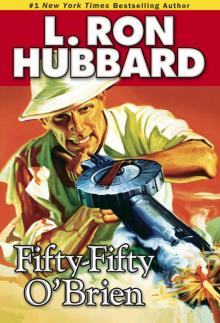 Fifty-Fifty O'Brien
Fifty-Fifty O'Brien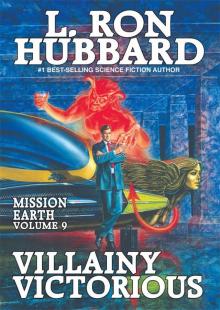 Villainy Victorious
Villainy Victorious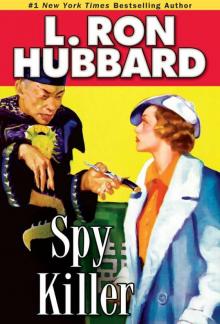 Spy Killer
Spy Killer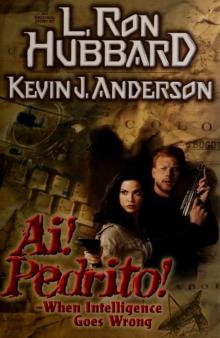 Ai! Pedrito!: When Intelligence Goes Wrong
Ai! Pedrito!: When Intelligence Goes Wrong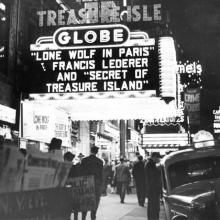 The Dangerous Dimension
The Dangerous Dimension Mission Earth Volume 1: The Invaders Plan
Mission Earth Volume 1: The Invaders Plan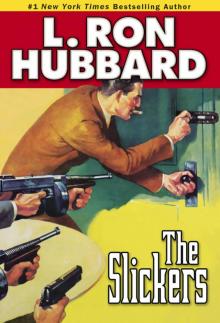 The Slickers
The Slickers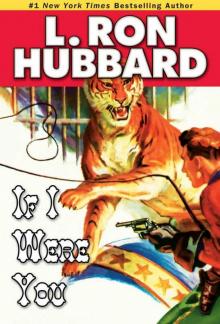 If I Were You
If I Were You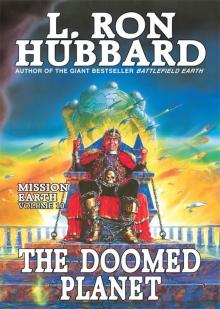 The Doomed Planet
The Doomed Planet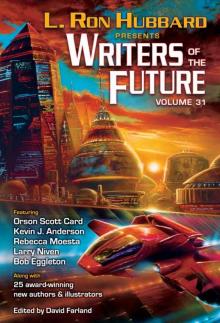 Writers of the Future Volume 31
Writers of the Future Volume 31 Mission Earth Volume 2: Black Genesis
Mission Earth Volume 2: Black Genesis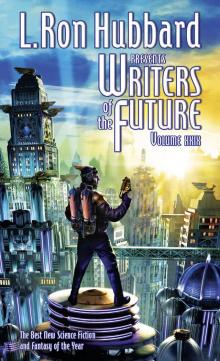 Writers of the Future: 29
Writers of the Future: 29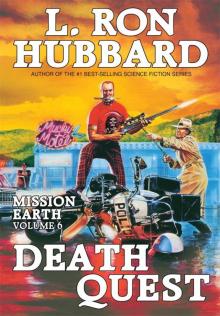 Death Quest
Death Quest The Enemy Within
The Enemy Within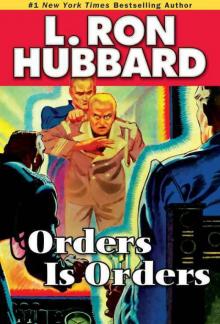 Orders Is Orders
Orders Is Orders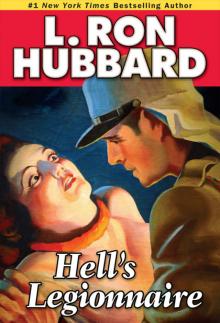 Hell's Legionnaire
Hell's Legionnaire L. Ron Hubbard Presents Writers of the Future 34
L. Ron Hubbard Presents Writers of the Future 34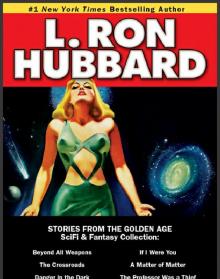 The Scifi & Fantasy Collection
The Scifi & Fantasy Collection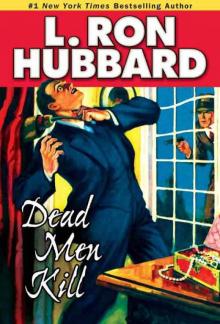 Dead Men Kill
Dead Men Kill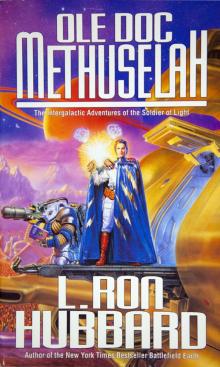 Ole Doc Methuselah: The Intergalactic Adventures of the Soldier of Light
Ole Doc Methuselah: The Intergalactic Adventures of the Soldier of Light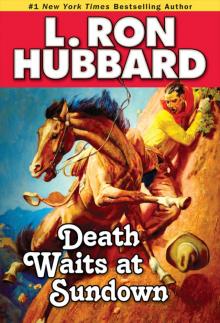 Shadows From Boot Hill
Shadows From Boot Hill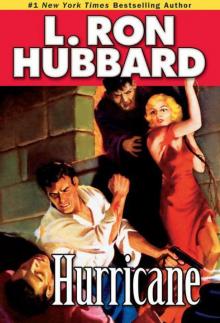 Hurricane
Hurricane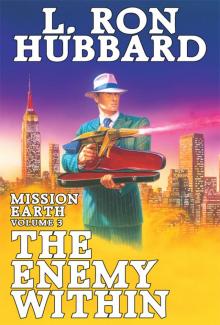 Mission Earth Volume 3: The Enemy Within
Mission Earth Volume 3: The Enemy Within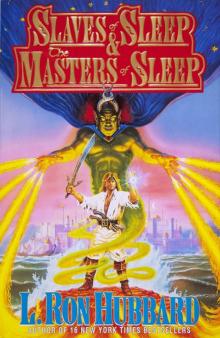 Slaves of Sleep & the Masters of Sleep
Slaves of Sleep & the Masters of Sleep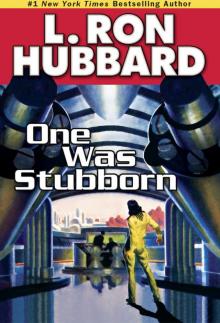 One Was Stubborn
One Was Stubborn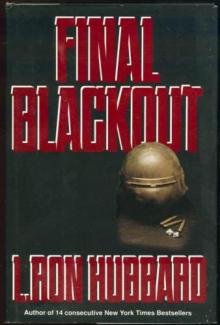 Final Blackout: A Futuristic War Novel
Final Blackout: A Futuristic War Novel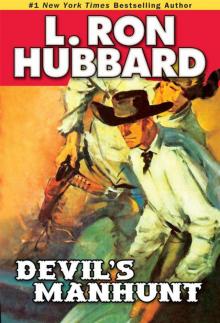 Devil's Manhunt
Devil's Manhunt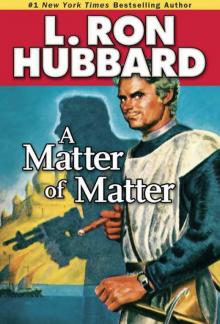 A Matter of Matter
A Matter of Matter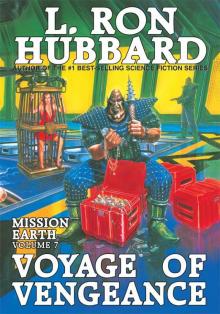 Voyage of Vengeance
Voyage of Vengeance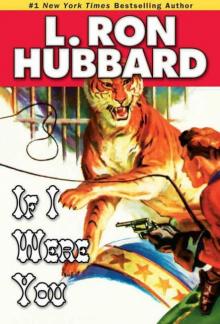 If I Were You (Science Fiction & Fantasy Short Stories Collection)
If I Were You (Science Fiction & Fantasy Short Stories Collection)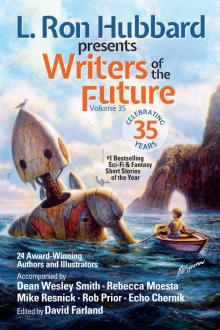 L. Ron Hubbard Presents Writers of the Future Volume 35
L. Ron Hubbard Presents Writers of the Future Volume 35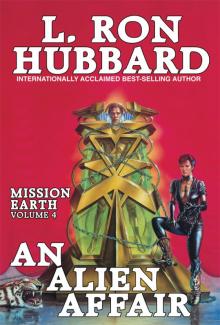 Mission Earth Volume 4: An Alien Affair
Mission Earth Volume 4: An Alien Affair Black Genesis
Black Genesis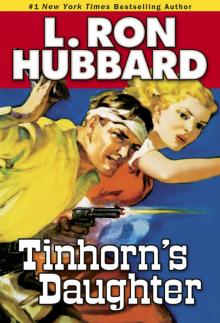 Tinhorn's Daughter
Tinhorn's Daughter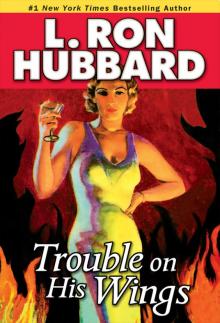 Trouble on His Wings
Trouble on His Wings Writers of the Future Volume 27: The Best New Science Fiction and Fantasy of the Year
Writers of the Future Volume 27: The Best New Science Fiction and Fantasy of the Year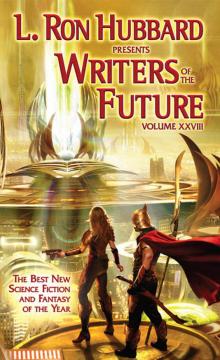 Writers of the Future Volume 28: The Best New Science Fiction and Fantasy of the Year
Writers of the Future Volume 28: The Best New Science Fiction and Fantasy of the Year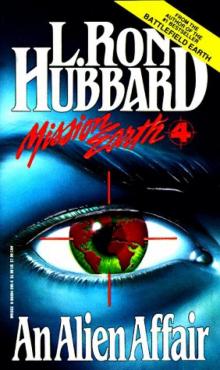 An Alien Affair
An Alien Affair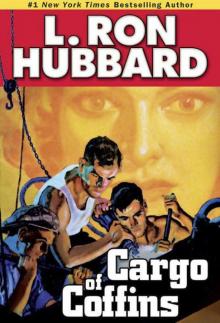 Cargo of Coffins
Cargo of Coffins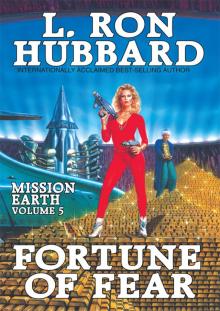 Mission Earth Volume 5: Fortune of Fear
Mission Earth Volume 5: Fortune of Fear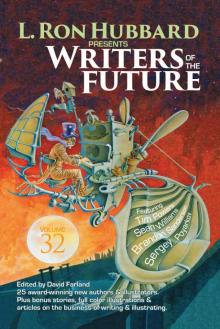 Writers of the Future 32 Science Fiction & Fantasy Anthology
Writers of the Future 32 Science Fiction & Fantasy Anthology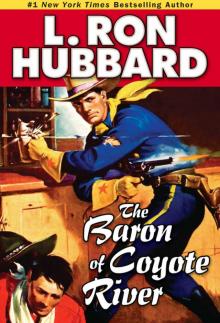 The Baron of Coyote River
The Baron of Coyote River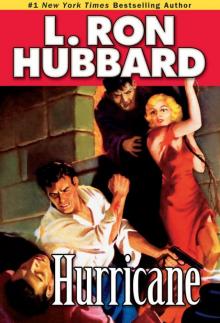 Hurricane (Stories From the Golden Age)
Hurricane (Stories From the Golden Age)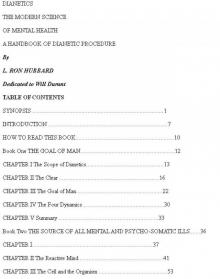 Dianetics: The Modern Science of Mental Health
Dianetics: The Modern Science of Mental Health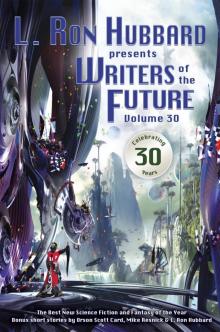 Writers of the Future, Volume 30
Writers of the Future, Volume 30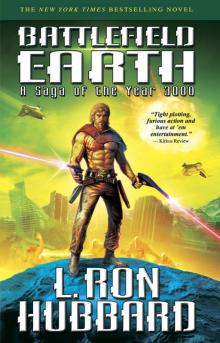 Battlefield Earth: A Saga of the Year 3000
Battlefield Earth: A Saga of the Year 3000 Fear
Fear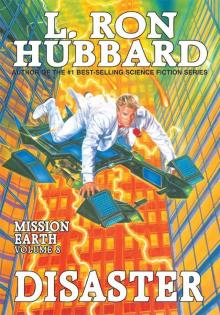 Disaster
Disaster Invaders Plan, The: Mission Earth Volume 1
Invaders Plan, The: Mission Earth Volume 1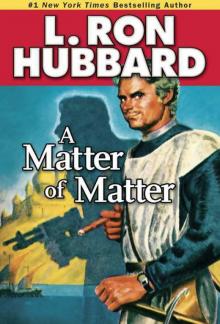 A Matter of Matter (Stories from the Golden Age)
A Matter of Matter (Stories from the Golden Age) Writers of the Future Volume 34
Writers of the Future Volume 34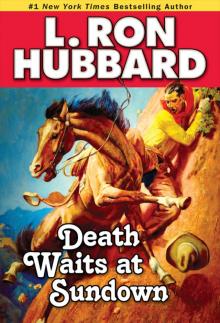 Death Waits at Sundown
Death Waits at Sundown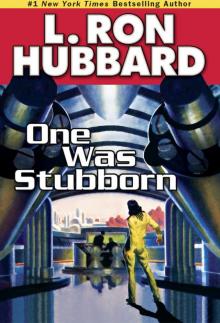 One Was Stubbron
One Was Stubbron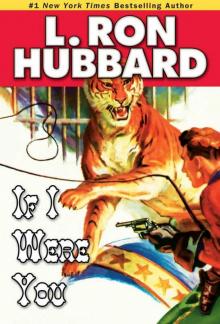 If I Were You (Stories from the Golden Age)
If I Were You (Stories from the Golden Age)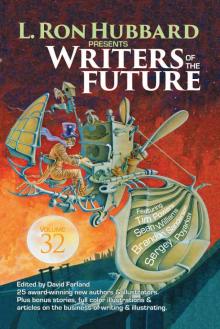 Writers of the Future 32 Science Fiction & Fantasy Anthology (L. Ron Hubbard Presents Writers of the Future)
Writers of the Future 32 Science Fiction & Fantasy Anthology (L. Ron Hubbard Presents Writers of the Future)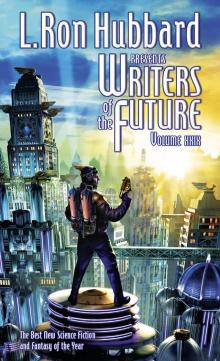 Writers of the Future, Volume 29
Writers of the Future, Volume 29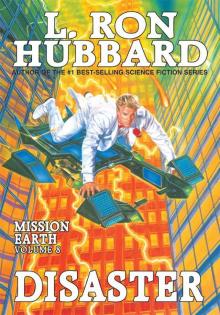 Mission Earth Volume 8: Disaster
Mission Earth Volume 8: Disaster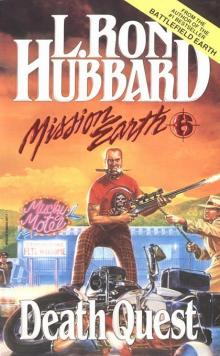 Mission Earth 6: Death Quest
Mission Earth 6: Death Quest Writers of the Future, Volume 27
Writers of the Future, Volume 27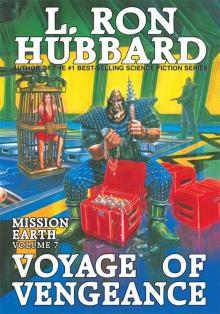 Mission Earth Volume 7: Voyage of Vengeance
Mission Earth Volume 7: Voyage of Vengeance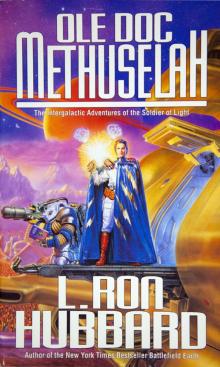 Ole Doc Methuselah
Ole Doc Methuselah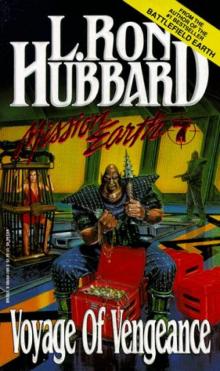 Mission Earth 07: Voyage of Vengeance
Mission Earth 07: Voyage of Vengeance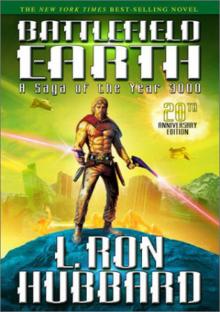 Battlefield Earth
Battlefield Earth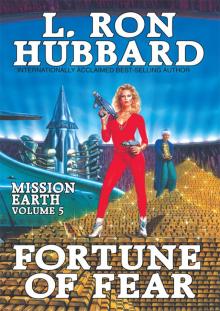 Fortune of Fear
Fortune of Fear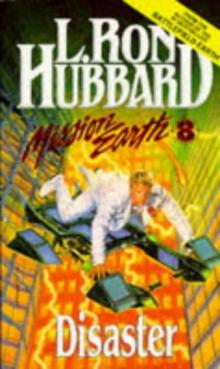 Mission Earth 8: Disaster
Mission Earth 8: Disaster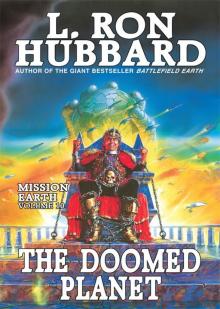 Mission Earth Volume 10: The Doomed Planet
Mission Earth Volume 10: The Doomed Planet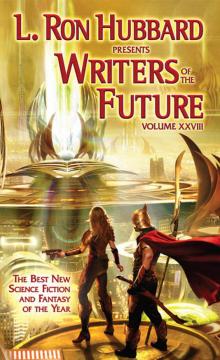 Writers of the Future, Volume 28
Writers of the Future, Volume 28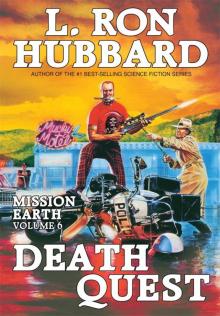 Mission Earth Volume 6: Death Quest
Mission Earth Volume 6: Death Quest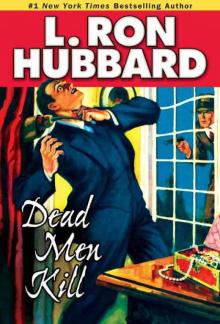 Dead Men Kill (Stories from the Golden Age)
Dead Men Kill (Stories from the Golden Age)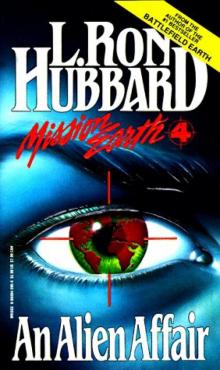 Mission Earth 4: An Alien Affair
Mission Earth 4: An Alien Affair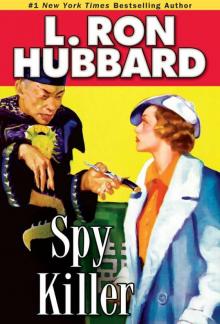 Spy Killer (Stories from the Golden Age)
Spy Killer (Stories from the Golden Age)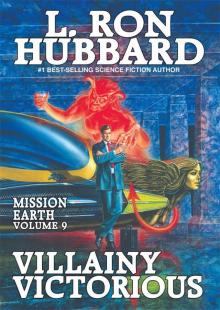 Mission Earth Volume 9: Villainy Victorious
Mission Earth Volume 9: Villainy Victorious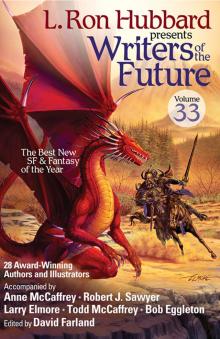 L. Ron Hubbard Presents Writers of the Future, Volume 33
L. Ron Hubbard Presents Writers of the Future, Volume 33